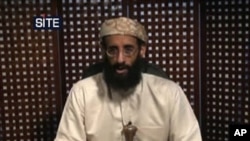The video-sharing website YouTube has taken hundreds of videos of a Yemen-based cleric from its site because it says they incite violence.
Roshonara Choudhry, 21, was given a life sentence Wednesday in Britain. In May of this year she stabbed a British politician, Stephen Timms, because of his support for the war in Iraq.
Choudhry told officers investigating the case that she had been motivated by videos she had watched on YouTube. She had downloaded more than 100 hours of lectures given by the Yemen-based cleric Anwar al-Awlaki, in which he called for Muslims to fight against the West.
Timms told the BBC that she was a smart girl who had been swayed by the internet.
"She was such a successful student and yet she was able to fall prey, throwing all of that away because of what she saw on the web," said Timms. "I think that is tragic and I think we do need to take care of other young people who might find themselves in a similar position."
A statement published by YouTube said the videos had been taken down because they violated the site's guidelines, which prohibit dangerous or illegal activities, including bomb making, hate speech, and incitement to commit violent acts. It said keeping the balance between free speech and averting calls to violence can be difficult.
British officials along with New York Congressman Anthony Weiner had pressed YouTube to remove the videos. Last week, in a letter to YouTube CEO Chad Hurley, Weiner said there is no reason we should give killers like al-Awlaki access to the internet service so they can inspire more violent acts.
Claire Yorke from the London-based research group Chatham House says the internet can be an effective way for extremists to spread their message.
"We have seen that the internet has been used very successfully by terrorist organizations who are able to propagate their message, they are able to reach out to large parts of society that maybe they would not normally," said Yorke. "People across the world have access to their messages if they choose to look."
But she says the power of the internet can be overstated.
"We also need to look at the motivations of the individuals in the real world that is making them look at this," added Yorke. "So I do not necessarily think the internet in itself is causing this, it is a two-way street."
She says monitoring the internet is not easy. And is a problem that will last well into the future.
"As we know the internet is vast and we are not yet aware of its boundaries or all the elements within it and therefore regulating something quite so huge is always going to be difficult task. And for every site you take down more will come," Yorke noted.
Anwar al-Awlaki was charged this week in Yemen for inciting violence against foreigners.
The head of Britain's intelligence agency MI5 recently said that al-Awlaki poses a particular threat to British security in part because he teaches in the English language.




